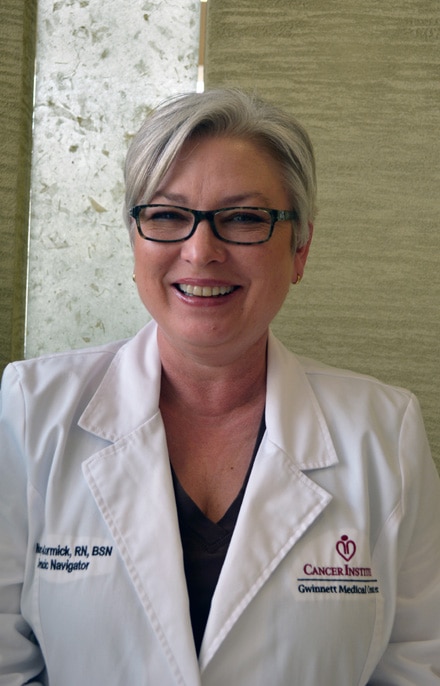
Here, Nan McCormick, RN, BSN, thoracic oncology nurse navigator at Gwinnett Medical Center helps you determine your risk and offers tips for changing it for the better.
The Non-smoker
Profile: You’ve never smoked, nor do you live with anyone who does. Non-smokers are not out of the woods. Other factors, including heredity, lifestyle choices and exposure to radon and asbestos can also increase your risk.
Reduce your risk: “Make healthy lifestyle choices,” says McCormick, “and, in areas where radon may be found, make sure your basement is well-ventilated. (Radon is a radioactive gas.)
The Sometimes Smoker
Profile: You light up at social gatherings or when you’re stressed.
Reduce your risk: As few as one to three cigarettes a day may substantially increase your risk for lung cancer. McCormick advises, “Squeeze stress balls, take a walk or meditate instead of smoking, and don’t bring cigarettes to social events. You’re likely to smoke less if you have to get cigarettes from someone else.”
The Second-hand Smoker
Profile: You don’t smoke, but you live with someone who does.
Reduce your risk: People who live with smokers are subjecting themselves to the same carcinogens that smokers do.” This is particularly disturbing when there are children in the home,” adds McCormick. If you live with a smoker, getting him or her to quit is your best bet for improving your health—and the smoker’s health. And if that doesn’t work? Ask them to smoke outside.
The Former Smoker
Profile: You were a smoker but kicked the habit.
Reduce your risk: The best thing you can do as a former smoker? Don’t pick it up again. And discuss your smoking and family history with your physician to get guidance on screenings.
The Smoker
Profile: You smoke daily.
Reduce your risk: Quit. Of the 250 known-to-be-harmful chemicals found in cigarette smoke, at least 60 can cause cancer. And whether you’re smoking one pack or several packs throughout the day, you’re exposing your body to those carcinogens.
“About half of all smokers try to quit in a given year—and fail,” says McCormick. “Take care of yourself emotionally and physically to support your efforts. Staying smoke-free is a daily battle for a long time.” Here’s one way Gwinnet Medical Center can help:
Freshstart Smoking Cessation
In this free, four-week session smoking cessation class written by the American Cancer Society, participants learn strategies for quitting and identify a personal quit plan. The next session begins March 5. Learn more at gwinnettmedicalcenter.org/freshstart or call HealthLine at 678-312-5000.
Lung Cancer Screening
Gwinnett Medical Center now offers lung cancer screenings with a low dose CT scan. This quick, painless exam can help determine if nodules or masses are present in the lungs of people who do not have symptoms of lung cancer, but may be at risk of the disease because of a history of smoking. Learn whether this screening may be right for you by calling McCormick at 678-312-3189.

